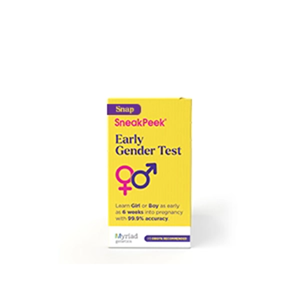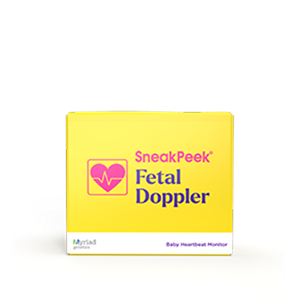Published on April 9th, 2022 and Updated on January 16th, 2024
Check out SneakPeek Gender Test to find out your baby’s gender as early as 6 weeks at over 99% accuracy1!
Whether it’s “I love you mama” coos, “I’m hungry” cries, or “Let’s play” chuckles, when your precious baby opens her mouth to talk, you can usually tell what she’s trying to say.
But what does it mean when she sleeps with her mouth open—and breathes through the mouth rather than the nose? Is mouth breathing during baby sleep unhealthy or a sign of something to be concerned about?
While not exactly healthy, continual mouth breathing in babies is almost always treatable. This habit typically signals an underlying condition that prohibits nasal breathing, like allergies or a deviated septum. With the right help, you can address the underlying issue and help your little one breathe a la nose.
Curious to learn more? Keep reading for our inclusive guide to nighttime mouth breathing.
On the other hand, if you’re wondering “what does it mean if my baby sleeps with her eyes open?” or “what does it mean if my baby twitches in her sleep?” we’ve written about these topics in detail as well on our blog!
Mouth Breathing 101: Signs & Symptoms
You’d think that mouth breathing would be easy to catch. However, this nighttime habit is surprisingly sneaky—especially in babies.
How do you know if your little guy has picked up the habit in his sleep? Unless you’re standing over his crib all night, it can be hard to tell. Luckily, there are a few symptoms that indicate a possible mouth breathing habit while sleeping,1 such as:
- Audible snoring
- Pillow drool spots
- Daytime mouth breathing
- Teeth grinding
- Snorting when crying
- Restlessness or excess fatigue
If you suspect that your baby sleeps with an open mouth, take a few nights to observe him. Even if his lips are only slightly parted, this still counts as open-mouth breathing and is something to note.
Why would my baby mouth breathe at night?
Before you assume the worst, just know it’s normal for babies to experience periods of mouth breathing. Only when mouth breathing becomes habitual (meaning your baby is mouth breathing every time he sleeps) do you have to worry for your little one. Most culprits behind mouth breathing either block the nasal passage or make mouth breathing more comfortable. You can break down these causes into three categories:
- Mucus obstructions
- Airway blockages
- Habits
Mucus Obstructions
When investigating mouth breathing, the first place to look is your baby’s nose. A nasal mucus blockage of any kind will encourage your baby to mouth breathe. At night, lying horizontally can amplify these blockage effects.
Consider these common and treatable underlying mucus creators:
- Allergies – Allergies are the top cause of nasal obstruction in children.2 If you suspect allergies, check for other signs like hives, itchy or red eyes, and sneezing. Your pediatric provider can suggest treatments to resolve these uncomfortable symptoms.
- Colds or sickness – We’ve all felt that oh-so-stuffy sensation of a bad cold. If sick, your baby might have the same nasal congestion. Luckily, this means her mouth breathing is temporary. Once better, nasal breathing can resume. For tips on the best sleeping position for a baby with a stuffy nose, check out our helpful guide.
- Sinusitis – If your baby just seems plain stuffy, then sinusitis might be at hand. This nasal infection inflames the sinus cavities, leading to excess mucus and difficulty breathing. You can consult a doctor for long-term treatment plans and use saline nasal sprays to alleviate mucus pressure at home.
Airway Blockages
It’s easy to dismiss breathing as “simple.” However, this critical action is actually pretty complex! From her lungs to her tongue, there are plenty of ways that your child’s breathing can become obstructed.
If you notice mouth breathing but there’s no mucus in sight, check for these possible upper airway blockages that could lead to an open mouth at night:
- Deviated septum – Usually unnoticeable, a deviated septum means your baby’s nose cartilage or bones have an abnormality. This can partially or fully block nasal cavities, leading to mouth breathing. Some deviated septums respond to anti-inflammatories, but the only permanent solution is surgery.3
- Sleep apnea – A catch-all term, sleep apnea means that your baby’s mouth has some sort of airway blockage, like enlarged adenoids, enlarged tonsils, or polyps. If your baby has sleep apnea, you’ll probably notice loud snoring and coughing at night. Treatment options include medical steroids, surgery, and oral pressure therapy.4
- Tongue-tie – A congenital condition, tongue-tie (or ankyloglossia) means your baby has excess tissue underneath her tongue that restricts movement.5 Most doctors and moms will notice tongue-tie immediately, since it can interfere with breastfeeding and even breathing. For most babies, surgery is a common solution.
Habitual Causes
Your baby’s little body is just starting to figure itself out. Sometimes, odd or unusual habits—like mouth breathing—are part of that journey!
If you find zero blockages behind your baby’s mouth breathing, then it just might be habitual. Genetic, behavioral, and environmental conditions can encourage your baby to sleep open-mouthed, including:6,7,
- Jaw overbite or underbite
- Thumb-sucking
- High stress levels
- Past illness or nasal obstruction
- Poor sleep environment
One particular habit to watch out for? Tongue thrusting.
Also known as open bite, tongue thrusting leaves your baby’s tongue pressed forward in his mouth.8 While normal for newborn babies, it should resolve into an adult tongue posture later. Thumb-sucking and delayed chewing can prolong tongue thrusting, creating an open mouth breathing habit.9
A lack of breastfeeding, or ceasing breastfeeding before 3 months, can also prolong tongue thrusting. This is because breastfeeding promotes nose breathing better than bottle feeding since your baby’s mouth and tongue muscles have to work harder during breastfeeding. However, if you are bottle feeding, you can prevent prolonged tongue thrusting by choosing a slow-flow bottle.
Is it dangerous for my baby to mouth breathe?
Everyone occasionally breathes through their mouths. However, you don’t want it to become a habit—especially for your baby.
If you notice drool stains on her pillow every night, then your girl might face some medical risks. From head to toe, let’s review the dangers of mouth breathing for your precious sleeper.
Oral Issues
Turns out, the nose is a pretty effective air filter! Cilia, or your baby’s tiny nose hairs, block bacteria and particles from entering your baby’s lungs, keeping them safe and healthy.
While the mouth can also handle that task, it’s not too great at long-term filtering. This means, over time, more bacteria will enter your baby’s lungs during sleep. Not to mention, more bacteria will build up inside your baby’s mouth during sleep.
Excess bacteria in the mouth can lead to unhealthy oral conditions like:
- Swollen tonsils or tonsillitis
- Gingivitis (gum infection)
- Tongue inflammation
- Dry mouth
- Teeth issues (cavities, erosion, etc.)
Long Face Syndrome & Growth Abnormalities
There’s nothing sweeter than your baby’s adorable face. Unfortunately, chronic mouth breathing can change and weaken her unique facial structure.
Continual mouth breathing stretches the face’s muscles and ligaments over time. This can eventually lead to a developmental condition called Long Face Syndrome,10 with symptoms like:
- Open bite or tongue thrusting
- Large chin
- Elongated face shape
- Gummy smile
- Overbite
- Speech problems
Reduced Oxygen Intake
A major difference between nasal and mouth breathing? Oxygen saturation.
Compared to nasal breathing, mouth breathing has a lower airstream intake and lower nitric acid levels, which help your body absorb oxygen.11 As a result, mouth breathers have lower oxygen saturation than nasal breathers.12 Over time, this can lead to oxygen-related issues like:13
- Reduced heart performance
- High blood pressure
- Reduced sleep quality
- Headaches
- Shortness of breath
- Asthma
How can I treat mouth breathing in my baby?
Before researching mouth breathing remedies, first ask—what’s causing my baby to sleep with his mouth open?
From stuffy colds to nasal polyps, every mouth breathing culprit requires its own form of treatment. Once you identify the root of the problem, you can choose the best mouth breathing therapy to help him snooze.
Treatments for Mucus-Related Issues
When it comes to nasal mucus, your best friend is water. All forms of hydration—drinking, steaming, spritzing—help break up this air-blocking substance. Luckily, mucus-related mouth breathing is easy to treat with home remedies like:
- Using a humidifier
- Spraying a saline solution into your baby’s nose
- Increasing hydration
- Removing mucus with a bulb syringe
Suspect an allergy is behind those constant sniffles? Proceed with caution. While medications may clear up a stuffy nose from allergies, consult your pediatrician before giving allergy medicine to your baby.
Treatments for Airway Obstructions or Habits
Not dealing with the mucus monster? Unfortunately, this means the culprit will be slightly trickier to handle.
For airway obstructions or behavioral habits, many babies will need the next step in treatment to cure their mouth breathing. These solutions include:
- Surgery – Whether treating a deviated septum or tongue-tie, sometimes surgery is the only true solution. Your pediatric surgeon or specialist can provide surgical options.
- Conditioning – At 2 years old, your child’s jaw is only 53% formed.14 Until the jaw is more developed, physical therapy for jaw-related mouth breathing is not an option. However, if the mouth breathing stems from thumbsucking, you can work to stop the habit and encourage nasal breathing. Some ways to stop your child from thumbsucking are by giving him a replacement object when he wants to suck his thumb (like a blanket or stuffed animal) and praising him for not sucking, or by using a thumb guard—a cover that’s placed over the thumb to prevent sucking.
- Guided appliance therapy – For newborns, any mouthpiece is a big choking hazard. However, you can consider giving your child an oral appliance (like Myobrace) once he turns 2 years old. These devices painlessly close the jaw during sleep.
In conclusion, while mouth breathing during sleep in babies isn’t an ideal scenario, it often points towards a treatable underlying condition like allergies, a deviated septum, or habitual causes. If you notice this habit in your baby, it’s essential to identify the root cause and seek the appropriate remedy, ensuring your little one gets the healthiest and safest sleep possible.
Sources:
- Goop. Mouth Breathing – Noticing & Correcting Mouth Breathing https://goop.com/wellness/health/noticing-and-correcting-mouth-breathing/
- American College of Allergy, Asthma and Immunology. Children. https://acaai.org/allergies/allergies-101/who-gets-allergies/children/
- Pediatric ENT Associates. How to Treat a Child’s Deviated Septum. https://www.pediatricentassociates.com/how-to-treat-a-childs-deviated-septum/
- Mayo Clinic. Pediatric obstructive sleep apnea – Diagnosis and treatment. https://www.mayoclinic.org/diseases-conditions/pediatric-sleep-apnea/diagnosis-treatment/drc-20376199
- Mayo Clinic. Tongue-tie (ankyloglossia) – Diagnosis and treatment. https://www.mayoclinic.org/diseases-conditions/tongue-tie/diagnosis-treatment/drc-20378456
- NCBI. Association between oral habits, mouth breathing and malocclusion. https://www.ncbi.nlm.nih.gov/pmc/articles/PMC5225794/
- Healthline. Mouth Breathing: Symptoms, Complications, and Treatments. https://www.healthline.com/health/mouth-breathing
- Healthline. Tongue Thrust: Reflex, Baby, Adults, Treatment, Symptoms, and More. https://www.healthline.com/health/tongue-thrust
- Gelb, Michael, Dr. Why Your Child’s Mouth Breathing Should Worry You/ https://www.drmichaelgelb.com/why-your-childs-mouth-breathing-should-worry-you/
- Healthline. Long Face Syndrome. https://www.healthline.com/health/dental-and-oral-health/long-face-syndrome
- Lenus. The health benefits of nose breathing. https://www.lenus.ie/bitstream/handle/10147/559021/JAN15Art7.pdf?sequence=1
- NCBI. Evaluation of oxygen saturation by pulse-oximetry in mouth breathing patients. https://pubmed.ncbi.nlm.nih.gov/21137662/
- Cleveland Clinic. Hypoxemia: Symptoms, Causes, Treatments. https://my.clevelandclinic.org/health/diseases/17727-hypoxemia
- The Stewart Center for Optimal Health. Airway & Jaw Development for Children. https://www.thestewartcenterforoptimalhealth.com/airway-jaw-development-for-children/
- Healthline. Tongue Thrust: Reflex, Baby, Adults, Treatment, Symptoms, and More. https://www.healthline.com/health/tongue-thrust
- NCBI. Association between oral habits, mouth breathing and malocclusion. https://www.ncbi.nlm.nih.gov/pmc/articles/PMC5225794/

Shop Our Products
SneakPeek aims to provide the most accurate and up-to-date information to help our readers make informed decisions regarding their health before, during, and after pregnancy. This article was written based upon trusted scientific research studies and/or articles. Credible information sources for this article are cited and hyperlinked.





